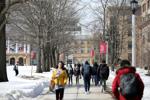Share this article paywall-free.
When graduate assistant Angela Ablaberdieva was scouting out a chemistry graduate program five years ago, family leave policies were a top concern.
UW-Madison’s chemistry department policy publicly touted its graduate assistant paid family leave policy, which caught Ablaberdieva’s eye — after studying in Turkey and spending a few years traveling, she was planning to have her first child after returning to the United States. When Ablaberdieva showed up to classes the first day pregnant with her son, however, her coordinator’s response wasn’t exactly positive.
“I said, ‘Hey, FYI, I’m pregnant and due at the start of next semester. Who do I talk to to get my paid leave?’” she said. “And (the coordinator) was like, ‘Oh my gosh, don’t tell that to anyone. I would definitely not tell anyone until after you have joined a (faculty member’s) research group.’”
People are also reading…
University of Wisconsin System graduate assistants and postdoctoral researchers who have a child while in their programs often are taking a risk: Like faculty and staff, they aren’t offered paid family leave. But unlike faculty and staff, they often aren’t protected by the federal Family Medical Leave Act, which means they risk losing their teaching, research or project assistant positions if they take a leave, even if it’s unpaid.
Losing those jobs can jeopardize their income, health insurance or tuition assistance the university gives them for assistant work.
The System requires employees to use sick or vacation days for up to six weeks of paid time off or take an unpaid absence. An employee who wants to take more than six weeks must use unpaid time off.
Since 2019, graduate assistants have been allowed to use any sick or vacation pay to bolster their paychecks while taking an otherwise unpaid leave.
Some graduate assistants said they’ve been able to work with faculty to keep getting paid during their leaves by changing the timing of fellowships or grants. One graduate assistant who asked not to be named for fear of retaliation from her department said she was told to drop out because her choice of parenthood was incompatible with the rigors of academia.
The UW-Madison Graduate Worker Union, also known as Teaching Assistant’s Association, hopes to change the system, drafting a letter to Chancellor Jennifer Mnookin to request extending 12 weeks of paid family leave to all employees and protections to graduate students in the next year’s budget.
Other large Big Ten schools, including Purdue, Ohio State and Michigan State, offer paid leave to employees.
A UW-Madison ad-hoc committee studying parental leave policies found that of universities similar to UW-Madison, 90% offer faculty an average of eight weeks of paid leave after the birth of a child and seven weeks for the parent who didn’t give birth or for an adoption. Of those same institutions, 80% offer graduate students an average of five weeks of paid leave.
But that may be hard to achieve in Wisconsin: Democratic Gov. Tony Evers’s budget proposed a guaranteed 12 weeks of paid leave for eligible public- and private-sector workers, including University of Wisconsin System employees, but that provision was stripped from the state’s biennial budget proposed by the Republican-led Joint Finance Committee.
UW-Madison policy states that students have the right to take a four-week unpaid leave, and some of its colleges and departments say they already offer paid family leave policies. The College of Engineering announced its intent to offer paid family leave for faculty and graduate assistants in 2017 and the Chemistry department approved giving six weeks paid leave to graduate assistants in 2008 to reduce academic and financial hardships.

Search for help
But students like Ablaberdieva say reality often falls short. In Ablaberdieva’s case, her research assistant work directly coincided with class credits she needed to take, meaning taking leave could affect her student status.
Between starting her program and her due date in January, Ablaberdieva went to nearly a dozen campus departments to discuss her situation, including human resources, chemistry department administration and campus administrative offices such as the Title IX, the Office of Equity and Inclusion and the McBurney Center, which advocates for students with disabilities.
UW-Madison spokesperson John Lucas declined to comment on Ablaberdieva’s experience with the chemistry department.
Ablaberdieva’s leave was approved after chemistry professor Judith Burstyn helped her sort out the process for accessing paid leave through the department’s program, which hadn’t been effectively communicated, Burstyn said. At that point, though, Ablaberdieva was disenchanted with the department and petitioned to end her doctoral program early, earn a master’s degree in chemistry and move to population health.
“They still view that like you failed the program. For people in chemistry, it’s embarrassing to master out,” Ablaberdieva recalled as she held back tears. “That was not how I wanted to feel on graduation, because getting your master’s is a big deal. And I feel like it was like a sign of failure.”
Falling behind
UW-Madison has been studying the feasibility of expanding paid family leave for years. In 2016, UW-Madison and the System jointly funded a study that would look into wages and benefits for workers for the first time in three decades.

No decisions have been made on expanding benefits at System universities, including UW-Madison, System spokesperson Mark Pitsch said in a statement.
“Our universities are always reviewing opportunities to attract and retain employees in a competitive environment,” he said.
The university’s ad-hoc committee found numerous gaps in UW-Madison’s family and parental leave policies, committee member Adena Rissman said. In its June 2022 report, the committee found multiple areas of inequity, such as employees being allocated different amounts of sick or vacation hours based on their title or appointment or the possibility of supervisors committing Title IX violations if they attempt to shorten or prevent unpaid leave.
“Wisconsinites value family and hard work — these values don’t conflict,” Rissman said. “We can support babies and parents and elders when they need it most, knowing that paid family leave improves workforce retention. This makes sense because people don’t have to quit their jobs to take care of a child who was just born or adopted, or their aging parent.”
Microbiology graduate assistant Erin Conley, who co-founded the Wisconsin Student Parents Organization, said the inconsistencies across campus are a diversity, equity and inclusion issue. Many students lack financial safety nets to take unpaid time off or can’t afford to lose their benefits, and the lack of policy disproportionately affects women and other birthing parents, she said.
“For me, it seems like it just very obviously creates further barriers to education or career advancement in the case of faculty, for women and these other groups that have been historically marginalized, specifically in academia,” she said.

Erin Conley says her department was able to secure funding to give her a maternity leave so she could recover from Maxine’s birth without losing her family’s health insurance.
Imperfect solutions
But even when UW-Madison departments want to offer graduate assistants leave, it can conflict with a student’s program, particularly if when students leverage research fellowships or apply for outside grants as part of their programs.
UW-Madison graduate assistant Lynne Cotter was elated that moving up a fellowship, a grant that relieves graduate students of their assistant responsibilities to conduct research, would allow her a break from teaching to give birth to her son. It wasn’t until Cotter was a few weeks out from giving birth that she learned the fellowship required her to still take three classes.
About two weeks after giving birth, Cotter was back in the classroom to ensure she didn’t lose her family’s health insurance.
“If I were able to be paid and keep my health insurance, I would have taken a semester off and I would have been able to spend time with my baby,” Cotter said.
Graduate assistant Kelly Jensen had been upfront with her supervising professor about family planning when she started her six-year program. Jensen was 29 when she enrolled; she and her husband didn’t want to wait to start a family until she graduated at 35.
Those early conversations led Jensen’s supervisor to time a research fellowship — a grant that relieves graduate students of their assistant responsibilities to conduct research — so it could serve as maternity leave when her first son was born in January 2021. Jensen completed her research that summer unpaid.
“I lost the award that everyone in my program gets to do their research. I sacrificed that so that I could have a maternity leave,” Jensen said. “And I don’t regret that. But that just goes to show there’s not a broader system in place to be both a mother and a Ph.D. student.”

A Wisconsin State Journal investigation identified nine employees who were accused of violating the university’s policy against hostile and intimidating behavior in the last six years.

UW-Madison recommended the professor be monitored but most students couldn’t recall that happening, calling into question the level of oversight applied.

At least two UW-Madison professors accused of hostile and intimidating behavior resigned amid the investigative process and now work for different institutions.

Despite UW-Madison confirming 30 allegations of abuse and bullying, the USDA lets the former professor run a lab out of the agency’s Madison office.

“This is a real problem that we do have to wrestle with,” said the deputy director for extramural research at the National Institutes of Health.





































